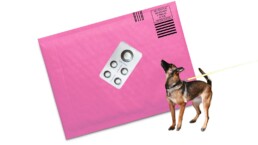How the police and the Postal Service can combine forces to crack down on abortion by mail
By Debbie Nathan, Lux
It was a tip that brought a dog to the main post office in downtown Jackson, Mississippi. An employee there had reported seeing someone in the lobby putting pills into hot pink envelopes.

Hours later, Ed Steed, a police officer from the small city of Richland, just south of Jackson, walked into a back room at the post office where one of the envelopes had been set aside. Steed, a K-9 handler, arrived with Rip, his narcotics sniffer dog. Rip strode around and, when he got to the pink envelope, sat down. According to records obtained through a Freedom of Information Act (FOIA) request, Steed said this meant the dog had smelled narcotics. That claim became evidence to get a warrant to open the envelope.
This, though, was no ordinary drug bust. As it turned out, there were pills inside the package, but they were not the kind that Rip or other police K-9s are trained to detect. The envelope contained five pills labeled “AntiPreg Kit.” They were made in India, and their medical purpose is to induce abortion. Dwayne Martin, at the time the head of the U.S. Postal Inspection Service (USPIS) in Jackson, told me this was exactly what the initial tipster had suspected.
About two-thirds of abortions in the U.S. in 2023 were done with mifepristone and misoprostol, the two-pill combination found in AntiPreg and similar products. Most were prescribed by clinicians at brick-and-mortar offices or through telehealth appointments. The World Health Organization advises that the pills are so safe in the first 12 weeks of pregnancy that supervision by a medical clinician is not needed. Taking the pills without clinician oversight is called “self-managed abortion.”
Recent Posts
New Addition to List of Nuclear Near Catastrophes
February 25, 2026
Take Action Now Debris flew for great distances — many times the distance of 270 meters to a nuclear reactor and nuclear storage facility.By David…
Gavin Newsom’s last budget belies his ‘California for All’ pledge
February 24, 2026
Take Action Now Yet, even as the state is poised to lose billions in federal funding, and millions of Californians are losing access to health care…
Israel and American Hawks are Pushing U.S. to Iran War With Catastrophic Consequences
February 23, 2026
Take Action Now At the World Health Assembly in May, member states may endorse an unprecedented strategy declaring that health is not a cost – but…
A Child’s View of the Attack on Venezuela. And a Peace Flotilla
February 23, 2026
Take Action Now Fabricio said that he and his family went out of their building and saw many people also going outside, running around, and kids…




